Editorial
Jab and flat-earthers

Tuesday 14th September, 2021
Social media, if properly used, can be a boon to a country, but in the hands of troublemakers bent on disseminating fake news, they could be as harmful, if not dangerous, as cut-throat razors wielded by mad monkeys. Unfortunately, some Sri Lankans tend to fall for baseless claims published on the Internet, hook, line, and sinker.
Reports that some Sri Lankan youth are wary of being inoculated against Covid-19 owing to false claims being circulated on social media about the vaccines have caused much concern to the health experts in charge of the national vaccination drive. The youth who fall for bogus claims that the Covid-19 jabs will adversely impact their libido and fertility, and therefore refuse to be vaccinated are making a huge mistake; they are exposing themselves to the danger of contracting Covid-19, which kills people of all ages indiscriminately. One’s libido and fertility do not survive one’s death, do they?
Anti-vaxxers are active on the Internet as never before. There is hardly anything these flat-earthers do not do to instill fear of vaccines into others. Their scaremongering is a threat to global health. What they believe in is the very antithesis of science, and nothing is stupider than to buy into their claims and remain unvaccinated.
What the Sri Lankan youth troubled by the jab scare, as it were, should bear in mind is that they have already taken several vaccines against viral diseases and benefited tremendously therefrom; they have been given the MMR vaccine, among others, to protect them against highly contagious diseases such as measles, mumps, and rubella. No harm has befallen them; instead these jabs have helped them remain healthy. It is science and nothing else that has enabled Sri Lanka to eradicate the polio menace. So, why fear vaccines that save lives?
True, vaccines could have some side-effects, which are rare, but impotence and infertility/subfertility are certainly not among them, medical experts inform us. There is an element of risk in almost everything—even in the act of crossing a road; does this mean people should stop walking on roads? There are rare instances where infants choke to death on mother’s milk, but this does not mean children should not be breastfed.
‘There’s a sucker born every minute’, American showman, P. T. Barnum, is reported to have said. This is a truism if the sheer number of gullible people amongst us is any indication. There have been numerous instances of mass hysteria in this country. Some years ago, many people claimed to have seen colourful rays emanating from some religious statues. When a carpenter turned self-proclaimed native physician claimed to have found a cure for Covid-19 with the help of a goddess, thousands of people went running to his village to buy his herbal syrup. Among those he took for a ride were the then Health Minister, the Speaker of Parliament, a large number of MPs and even some doctors. A national university went so far as to grant the untested product ethical clearance. So, it is only natural that there are many Sri Lankans who believe in false claims disseminated on social media about the Covid-19 vaccines.
During the last several days, we have seen young men and women queue up near vaccination centres in an orderly manner. They have earned praise for their exemplary behaviour, and set an example to the elderly folk who shove and jostle to receive vaccines, making a nuisance of themselves to the police and health workers.
The youth who are said to be wary of being vaccinated against Covid-19 owing to misconceptions and unfounded fears ought to emulate the aforesaid intelligent men and women, stop believing in non-science, and go running to grab a jab. That is the way they can prove that they are as smart as the mobile phones they carry, and not a bunch of flat-earthers.
Editorial
Budget sideshows

Friday 21st February, 2025
A typical Sri Lankan budget debate is currently underway. The focus of most Opposition politicians is on the politics of the budget rather than its economics. Sideshows in the House usually eclipse the national budget.
The Opposition pretends to be scandalised that the JVP-led NPP government’s maiden budget is out of sync with the JVP’s core ideology. Its MPs are heard lamenting in Parliament that the NPP has deep-sixed the JVP’s original economic policies.
True, there is a world of difference between the economic principles underpinning Budget 2025 and what is stated in the JVP’s Revolutionary Policy Declaration published under Rohana Wijeweera’s leadership. However, times have changed. So has the JVP as well as other political parties. In fact, the Opposition and the public should be happy that the JVP has jettisoned its ideological shibboleths and come to terms with the current politico-economic reality. The Opposition bigwigs ought to tell the public what they expect the NPP government to do. Do they want the JVP-led coalition to revert to its Marxist agenda despite the present-day economic reality and challenges facing the country?
President Anura Kumara Dissanayake, who presented Budget 2025 to Parliament on Monday, boasted that his government had proved its critics wrong by retaining the support of the IMF and managing the economy properly. In saying so, he unwittingly provided grist to the Opposition’s mill. It did not occur to him that his party, the JVP, had accused the IMF of furthering the interests of neo-imperial forces at the expense of the Global South and even vowed to liberate Sri Lanka from its clutches!
The Opposition should bear in mind that the economic crisis is bound to take a turn for the worse unless the government fulfils the IMF bailout conditions. It had to ensure that Budget 2025 was consistent with the IMF guidelines and the Economic Transformation Act, and assure the IMF that the stipulated revenue targets would be met. It has also had to stick to the borrowing limits prescribed by the IMF to manage the debt crisis. The Opposition has not cared to look at the bigger picture for political reasons and is trying to earn brownie points with the public.
Some vociferous Opposition politicians are now doing exactly what the JVP-led NPP did in the past to gain political mileage—misinforming and misleading the public with hypercriticism and false promises. Criticising the SLPP-UNP government’s approach to resolving the economic crisis under President Ranil Wickremesinghe’s watch, the NPP pledged that, if voted into office, it would upend the IMF programme. It said it would, among other things, grant public sector workers biannual pay hikes, bring down the prices of essentials, ensure that farmers would receive Rs. 150 as the guaranteed price for a kilo of their paddy, turn the MPs’ housing scheme into a university hostel complex, and make automobiles to be imported accessible to ordinary people. Today, it finds itself in an unenviable position, striving to justify its broken promises.
Meanwhile, the NPP, which held numerous work stoppages during previous governments, is now going to sample a dose of its own medicine. Expressing their utter disappointment with Budget 2025, some state sector trade unions have threatened to strike unless their demands are granted.
Workers no doubt deserve better pay, given the ever-increasing cost of living, but the question is whether it is feasible to allocate more funds for state sector salaries and pensions without increasing taxes, which are already very high. Private sector workers are experiencing the same economic hardships as their state sector counterparts, but they have not received any pay hikes. The state workers should be happy that they have been paid their salaries despite the economic crisis.
Budget 2025 contains some flaws, which we intend to discuss later, and it is the duty of the Opposition to make an in-depth analysis of what the government has proposed and make a critical evaluation thereof, but it will have to support its arguments with alternative solutions to the problems it has highlighted if it is to influence and shape public opinion. Mere sideshows and rhetoric won’t do.
Editorial
Rise of underworld

Thursday 20th February, 2025
Yesterday’s shooting incident inside a court at Hulftsdorp, Colombo, must have sent a chill down the spine of every law-abiding citizen. A gunman, disguised as a lawyer, shot a suspect named Sanjeewa Kumara alias Ganemulla Sanjeewa, despite a heavy police presence at the court complex. What the underworld attack inside a heavily guarded court and the ease with which it was carried out signify is the growing vulnerability of the public vis-a-vis the rise of the underworld. Hardly a day passes without underworld attacks being reported.
Yesterday’s courtroom killing was however not unprecedented. An underworld figure called Dhammika Amerasinghe was killed inside the Colombo Magistrate’s court in January 2004. The assassin posed as a law student. An upright judge also died at the hands of an underworld hitman in November 2004. High Court Judge Sarath Ambepitya and his police bodyguard were gunned down in front of his residence in Colombo 07. The underworld proved its ability to strike at will again in February 2017, when a gang attacked a prison bus in Kalutara, killing five inmates and two prison officers.
The JVP-led NPP came to power, vowing to neutralise the netherworld of crime and narcotics in less than two ‘lunar months’. But that pledge has gone unfulfilled. A staccato burst of queries from a group of hectoring reporters on the courtroom shooting left Deputy Minister of Public Security Sunil Watagala almost speechless at Hulftsdorp yesterday. Cabinet Spokesman and Minister Nalinda Jayatissa told Parliament that the government would do everything in its power to neutralise criminal gangs. It is everyone’s fervent wish that the government will succeed in its endeavour.
It was reported yesterday that a police constable who fled the country in 2023 after aiding and abetting an abortive underworld bid to raid the CID headquarters and extract a drug baron, known as Harakkata, had been arrested in India. The suspect tried to poison a group of police personnel. The police have revealed that the gang that sought to spring Harakkata free had even hired several serving commandos. Such is the power of the underworld, which is awash with arms and money. It is against this backdrop that threat assessments and VIP security under the incumbent administration should be viewed.
Former Public Security Minister Tiran Alles continues to have STF protection in view of underworld threats to his life, according to media reports, but security provided to former President and Commander-in-Chief, Mahinda Rajapaksa, under whose watch the LTTE’s military wing was defeated has been reduced drastically.
It is doubtful whether all LTTE combatants who surrendered or were captured underwent proper rehabilitation before being released. Not all LTTE military wing members were killed or captured. On 15 May 2022, The Hindu reported that the Indian intelligence agencies had ‘warned of erstwhile cadre of the banned Liberation Tigers of Tamil Eelam regrouping to launch attacks in Sri Lanka, as the country is embroiled in a deep economic and political crisis’. In December 2024, the Indian media reported that the government of India had submitted before a Delhi High Court tribunal that ‘even after its military defeat in May 2009 in Sri Lanka, the LTTE has not abandoned the concept of ‘Eelam’ and has been clandestinely working towards the cause … and the remaining LTTE leaders or cadres have also initiated efforts to regroup the scattered activists and resurrect the outfit locally and internationally’. The tribunal declared that it was of the opinion that ‘there is sufficient and cogent material on record for declaring the LTTE an unlawful association. Hence the need for former Sri Lankan Presidents and military commanders who were instrumental in defeating the LTTE to be protected by elite forces.
Meanwhile, the UK is reported to have warned that the possibility of terror attacks in Sri Lanka cannot be ruled out. Foreign travel advisories may pertain to popular tourist destinations in Sri Lanka, but the focus of a strategy to meet such threats must be on the entire country.
The rise of the underworld is not a recent phenomenon. It has happened over the years under successive governments. The NPP made the mistake of underestimating the power of organised criminal groups and pledging to wipe them out in about two months. Some of the former military and police officers in its ranks may have misled the NPP into believing that eliminating organised crime would be a walk in the park. Understanding a problem properly is half the battle in solving it.
One can only hope that the government will stop believing in its own rhetoric, make a thorough study of the complex issues related to public security and defence and redouble its efforts to make the country safe for one and all. It would be a mistake for the government to play politics with VIP security, as its predecessors did.
Editorial
Hypocrites as democrats

Wednesday 19th February, 2025
Several MPs, representing both sides of the House, were at their oratorical best, defending media freedom and people’s franchise, during Monday’s parliamentary debate on the Local Government Elections (Special Provisions) Bill, which was passed. The government members lashed out at their Opposition counterparts for having postponed elections, and not to be outdone, the latter tore into the former. Prominent among the debaters were SLPP MP Namal Rajapaksa and NPP MP and Leader of the House Bimal Ratnayake. Namal shed copious tears for the media, which, he said, was facing threats. Bimal accused the Opposition, especially the SLPP, of having postponed elections for political reasons.
A cursory look at the history of the self-proclaimed defenders of the media and democracy reveals glaring contradictions between their words and actions. What moral right does the SLPP have to flay others for threatening the media? The Rajapaksa rule was a nightmare for journalists; it earned notoriety for heinous crimes against the media, including arson attacks on newspaper presses and television stations and the assassination of Sunday Leader editor Lasantha Wickrematunge. A large number of journalists had to flee the country to escape death. The SLPP has no concern for the people’s franchise. It postponed the local government (LG) elections in 2022, and the following year, it helped the then President Ranil Wickremesinghe make the LG polls disappear.
The JVP seems to think all Sri Lankans have drunk from the Lethe. It has an ugly history of unleashing barbaric violence in a bid to scuttle elections. In the late 1980s, its spree of violence left dozens of voters dead, and enabled the then UNP government to make the most of the extremely low voter turnouts in elections and retain power by stuffing ballot boxes. In 2017, the JVP had no qualms about helping the UNP-led Yahapalana government postpone the Provincial Council (PC) polls by securing the passage of the controversial PC Elections (Amendment) Bill, which contained a large number of committee-stage amendments that made the proposed law materially different from the one that had been gazetted and examined by the Supreme Court. The SLPP leaders who were in the Joint Opposition during the Yahapalana government, the SLFP, the ITAK, the SLMC and all other parties represented in Parliament unflinchingly supported that Christmas Tree Bill and helped postpone the PC elections. Now, all of them are demanding that the PC polls be held!
The JVP, whose leaders launch into tirades against former President Wickremesinghe at the drop of a hat, backed him to the hilt during the Yahapalana government. They even helped him retain the premiership when President Maithripala Sirisena tried to sack him in 2018!
The SJB leaders who pontificate to others about the virtues of democracy were in the Yahapalana government, which put off the PC polls indefinitely. They will not be able to live down that black mark.
It behoves voters to assert themselves and give governments with steamroller majorities sobering knocks in the form of midterm electoral shocks to prevent the latter from succumbing to autocratic tendencies that absolute power usually breeds. Old habits die hard. A group of JVP/NPP activists resorted to strongarm tactics to disrupt a farmers’ meeting organised by the Frontline Socialist Party in Angunakolapelessa last week. A JVP activist visited a political rival and issued a veiled threat by warning the latter about the consequences of circulating anti-government posts via social media. A deputy minister tried to enter a meditation centre in Gampaha, with a group of his supporters, claiming that he had received complaints about the place. Such matters must be left to the police and the judiciary. Are we witnessing the signs of the NPP carrying out its promise to devolve judicial powers to the villages and the ruling party politicians beginning to emulate Mervyn Silva, who took the law into his own hands with impunity during the Rajapaksa rule?
It may be that there’s a sucker born every minute in this country, but not all Sri Lankans are suckers. Let the hypocrites of all political hues posing as great democrats be urged to remember that non-voters in last year’s general election numbered more than 5.3 million. There is a groundswell of anti-politics, which they must not lose sight of if they are to avert a situation where they might have to head for the hills, the way the Rajapaksas did in 2022—absit omen!
-
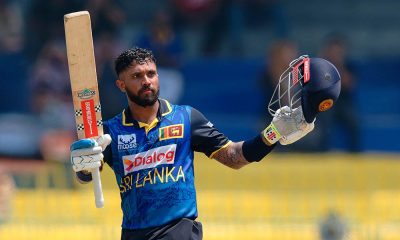
 Sports6 days ago
Sports6 days agoRemarkable turnaround for Sri Lanka’s ODI team
-
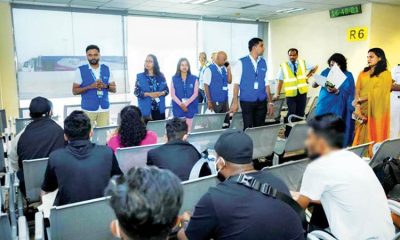
 Features6 days ago
Features6 days agoScammed and Stranded: The Dark Side of Sri Lanka’s Migration Industry
-
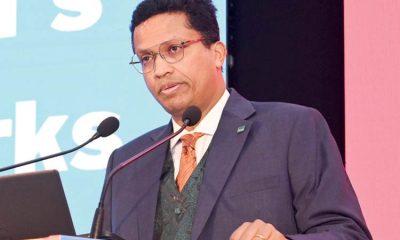
 Business6 days ago
Business6 days agoUN Global Compact Network Sri Lanka: Empowering Businesses to Lead Sustainability in 2025 & Beyond
-
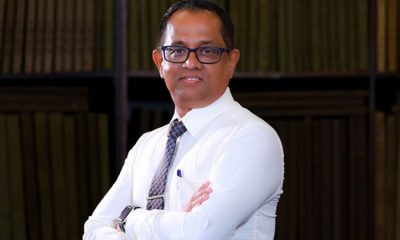
 News7 days ago
News7 days agoSpeaker agrees to probe allegations of ‘unethical funding’ by USAID
-
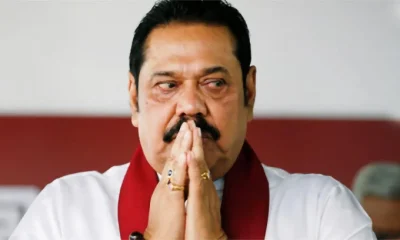
 Features5 days ago
Features5 days agoDon’t betray baiyas who voted you into power for lack of better alternative: a helpful warning to NPP – II
-
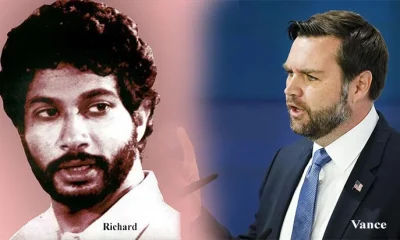
 Features5 days ago
Features5 days agoTwo films and comments
-

 News3 days ago
News3 days agoCommercial High Court orders AASSL to pay Rs 176 mn for unilateral termination of contract
-
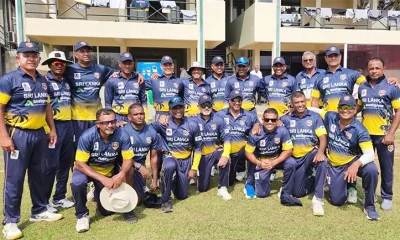
 Sports2 days ago
Sports2 days agoSri Lanka face Australia in Masters World Cup semi-final today











